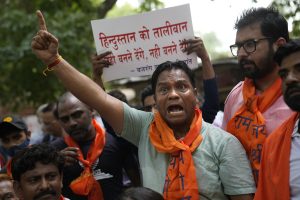On June 28, two Muslim men walked into the shop of a Hindu tailor, Kanhaiyalal, in Udaipur in western India and killed him with meat cleavers. They filmed the macabre attack, claimed responsibility for the killing, even identified themselves by name as Mohammed Riyaz Akhtar and Mohammed Ghous, and then went on to circulate the video online.
The killing, they said, was in defense of their Islamic faith. Akhtar and Ghous said they killed Kanhaiyalal over a social media post in support of now-suspended BJP spokesperson Nupur Sharma’s comments insulting Prophet Mohamed and Islam. Sharma’s comments had triggered a tidal wave of rage in the Muslim world.
Akhtar and Ghous were arrested on the night of the killing. Treating the attack as a “terror incident,” the Union Home Ministry dispatched a team from the National Investigation Agency, India’s counterterror task force, to investigate the killing and especially whether there were any organizations and international links behind the attack. The NIA registered a case against Akhtar and Ghous under the Unlawful Activities (Prevention) Act (UAPA), an anti-terrorism law.
If we define terrorism as violence, whether by state or non-state actors, that is pre-meditated and politically motivated, and whose target is not just the immediate victim but the larger community, then the grisly killing of Kanhaiyalal qualifies to be treated as a terrorist act. Akhtar and Ghous did not want to just murder Kanhaiyalal but to broadcast it. Terrorism is violence for effect; NIA officials said the duo wanted to “strike terror among the masses across the country.”
Police did well in swiftly arresting Akhtar and Ghous. The NIA was right in slapping the duo with charges under the UAPA.
However, rarely have authorities in India, whether at the federal or state level, shown similar alacrity or efficiency in dealing with violence by Hindutva activists that also qualifies to be labelled as terrorism. Indeed, rarely are such killers even called out in India for what they are – terrorists.
Attacks by Hindutva activists on Muslims has grown significantly since the Hindu nationalist Bharatiya Janata Party (BJP) came to power in 2014. Muslim homes, businesses, and places of worship have been burned or bulldozed. Hindutva outfits have harassed, burned, or beaten to death hundreds of Muslims, often in the name of defending Hindu values and culture. For instance, the Bharatiya Gau Raksha Dal (BGRD), whose activists are also members of Hindutva outfits, claim that their attacks on Muslims (who are beef-eaters) are to protect cows, which Hindus consider sacred.
BGRD gangs have lynched to death dozens of Muslims, and, like Akhtar and Ghous, they record videos of these horrific killings and post them online. As I argued in a 2017 article in The Diplomat, their violence qualifies to be called terrorism. But these killers are referred to as “gau rakshaks” (protectors of cows) and not “terrorists.” None of the attackers has been charged under the UAPA. In fact, few have been arrested.
Unlike attacks carried out by Islamist extremists, where perpetrators are swiftly arrested and charged, when Hindutva extremists are involved, the wheels of justice have moved slowly, if at all. The accused roam free, with some even being rewarded with seats in parliament.
Abhinav Bharat, a closed group of Hindu right-wing activists, which was involved in the terrorist attacks on the Samjhauta Express and Mecca Masjid in 2007 and the Malegaon blasts in 2008, does not figure in India’s list of proscribed terrorist groups. Indeed, a list of 36 individuals designated as terrorists under UAPA does not include even a single Hindu.
A week before Kanhaiyalal’s killing, Umesh Kolhe, a chemist in Amravati in Maharashtra, was stabbed to death. He was reportedly killed for a post supporting Sharma’s remarks. Seven men have been arrested. On Wednesday, police arrested a cleric, Syed Salman Chisti, for posting a video online offering his house and other property as reward to anyone who beheaded Sharma.
India can expect a surge in terrorist violence in the months to come. An uneven application of law will only accelerate this surge.

































